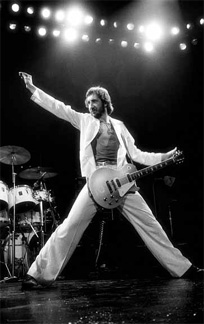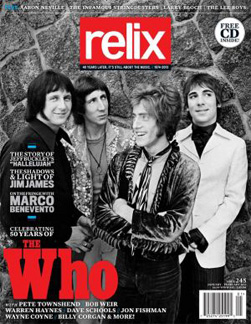Billy Corgan on Pete Townshend: “Suffering No Fools” (Expanded)
The Who appear on the current cover of Relix in a feature that includes an interview with Pete Townshend as well as many musicians’ memories of the group. We previously presented Widespread Panic bassist Dave Schools’ thoughts on John Enwistle, Phish drummer Jon Fishman’s take on Keith Moon, the memories of Bob Weir and Warren Haynes and The Flaming Lips’ Wayne Coyne. Here is an expanded version of Billy Corgan’s thoughts on Townshend and The Who.

Photo by Neal Preston
I remember when I was little, listening to a 7" of “Pinball Wizard” my cousin had and loving the guitar. The thing that sticks out in my mind about the first time I heard “Pinball Wizard” was how different it sounded than all the other bands. It was powerful but it wasn’t like what you were used to hearing. Even now, The Who’s music strikes me as really distinctive. The language and the way they play together are so unique. I remember thinking that at the time.
My relationship with The Who, in a personal way- where the music meant something to me personally- that took time. They were on the radio of course and the songs were everywhere. I knew who they were and I would see things on TV in the ‘70s. I never had that personal connection until I was about 18 when I got Meaty Beaty Big and Bouncy.
If you listen to Pete’s songs without the band – lately I’ve been listening to the Quadrophenia demos that came in that box set – the music is not as rugged or aggressive. There’s something about Pete’s introspective songwriting meeting the street thuggery of the band that I think, to a young a man, you identify with its fighting spirit. It’s an existential identification as opposed to let’s say the punk ethos of the Sex Pistols. The Sex Pistols, to me, sounded like fighting music. The Who sounded like “I’m trapped in something and I’m not really sure what to do but I’m going to kick my way out of here” kind of music. It had a different emotional resonance to it: the lyrics, the feelings, even the different periods of the band. Of course, the more I’ve listened, the more you realize there’s a real depth there that you can’t easily quantify. Particularly in modern music where so much music is sort of a one-note Johnny kind of thing. The depth of The Who is almost shocking compared to modern music.
I identify with Pete because of the superior songwriting. I know him a little bit personally, and certainly that helps, but I think that his forward thinking in terms of where music was headed and his spiritual willingness to set him into something that was very ahead of its time.
I’ve often said that, in many ways, The Who was probably the closest blueprint to my band as far as introspective singer/songwriter finds aggressive, ever melting down rock vehicle to perpetrate his wares. In a way, even more so when I was in the Pumpkins in the ‘90s, I identified with The Who even more because I really felt like I understood what Pete was expressing interpersonally about what he was going through as a person and then his experience in a band that couldn’t be controlled.
Even in their poppy, ‘60s incarnation, The Who weren’t cuddly. There was a kind of a smirking, snotty punk thing. I think to an accommodating class – rock and roll has become about accommodation more than anything else – the message is too complex; the history too non-linear. The enduring legacy of some of the things that Pete helped create that can stand on a Broadway stage. I think for your normal punter, that’s just too deep.

The way that rock history gets assessed, I’m going through this version of it myself as I get into my 40s. People start to say, “Well, you were this, you were that and you’re not this.” You know, The Beatles are always going to be No. 1 between the pop ability, the insane amount of talent and their cultural relevance – and continued cultural relevance. No one is going to surmount that.
But commonly slated, the Stones get slotted in pretty easily to No. 2 and part of that is because of the endurance of both the band and the music and of course the identification of the two keys members – Keith and Mick. With The Who, it really was a collective consciousness as much as my original band was a collective consciousness in and of itself.
Much like Zeppelin, Keith Moon’s untimely death ruptured that collective consciousness in a way that it couldn’t necessarily continue in a consistent idiom and I think that even though they’ve been able to go out and mount tours and been successful – and I’ve seen them myself – without all those pieces intact and without that collective message continuing, I think sometimes it’s hard to translate the depth and the meaning of the depth in future generations that just want cuddly hits.
Even The Who’s anthem “What Get Fooled Again” or “Baba O’Reilly,” do most of the people listening to those songs even know what it means? Do they have any real emotional connection to the depth of the music? I would say no they just like the music and the riff – and that’s fine. Look – and this is no diss on the Stones – but you listen to “Start Me Up,” you know what he’s talking about. The way people quantify relevance, that’s a general way of counting relevance that doesn’t taken into account the special relevance of The Who.
Here’s an example that I think is telling. After 9/11, there was that concert they had at Madison Square Garden where there were a lot of fire fighters, police and transit authority people. The depth that The Who’s music brought emotional relevance to what is a singular moment, there’s very few bands that could have brought that pathos and that depth and that spirit into that moment. That shows you what’s sitting there and largely untapped for people who just want to wave their hands in the air.
The Stones were emblematic of the benefits of rock and roll excess. The Beatles were the beneficiaries of an incredible excess of talent. The Who is really the excess of consciousness and that’s where it doesn’t just slot into your rock and roll blog or column. You can’t find a band like that with one song.
One other example I would give: look no further than the Rock and Roll Circus. You got Lennon playing “Yer Blues,” you got the Stones at what many people consider their spiritual peak and The Who blow all of them off the stage. It was a bootleg thing and then it had an official release 15 or 20 years ago. I remember the first time I saw it being astounded by how much better The Who were. They were exponentially better than the other bands.
What makes Pete a remarkable person is that he’s very, very human. He’s been through every version of it and he’s settled into human. And I mean that in the grandest form of the compliment. He’s a real person. I just emailed him a note the other day because I read his autobiography and I got back this lovely, personal note that can only come from someone who’s quite human and quite real. I think the fact that he survived intact and shared his journey so wonderfully – for better and worse – I think that’s the mark of a true artist.
We’ve all got our fantasy – I had the KISS poster on the wall in 1976. And I love that part of it, too. But Pete’s a real fighter and he went in there at different times and came out with stuff – stuff that really endures. Stuff that really has a depth to it that’s more akin to a European art film that just a trite piece of pop pabulum. I think what’s funny about The Who – and where you can’t just say, Well, it’s an art band – when they decided to make pop, they were quite successful. They showed themselves to be quite an ace pop band. It wasn’t like they just had the one gear – they had any gear they wanted.
This is what I was trying to say: when you’re in the room with a true artist who’s taken that journey and will suffer no fools – and he’s very invested in the process, very invested in what it means to be an artist – you can’t help but walk away feeling like it’s not the romantic side of the path. It’s the real side of the path. It’s like when you meet a monk who’s meditated for years and years, there’s no bullshit in them. I think Pete’s reached a point in his life where there’s no bullshit in Pete. He’s a straight shooter, he’s a lovely person and his heart’s true and I think we’ve all benefited from [his] incredible creativity.
There’s one moment that comes to mind when I saw The Who play at the Hollywood Bowl a few years ago. Roger Daltrey was being very sweet and he was talking about Pete and they finished a song and Roger said something along the lines of, “I just love that song and it really shows the genius of my partner.” And he did this little introduction to Pete. There’s a real warmth there from two guys that have probably butted heads many, many times.



















